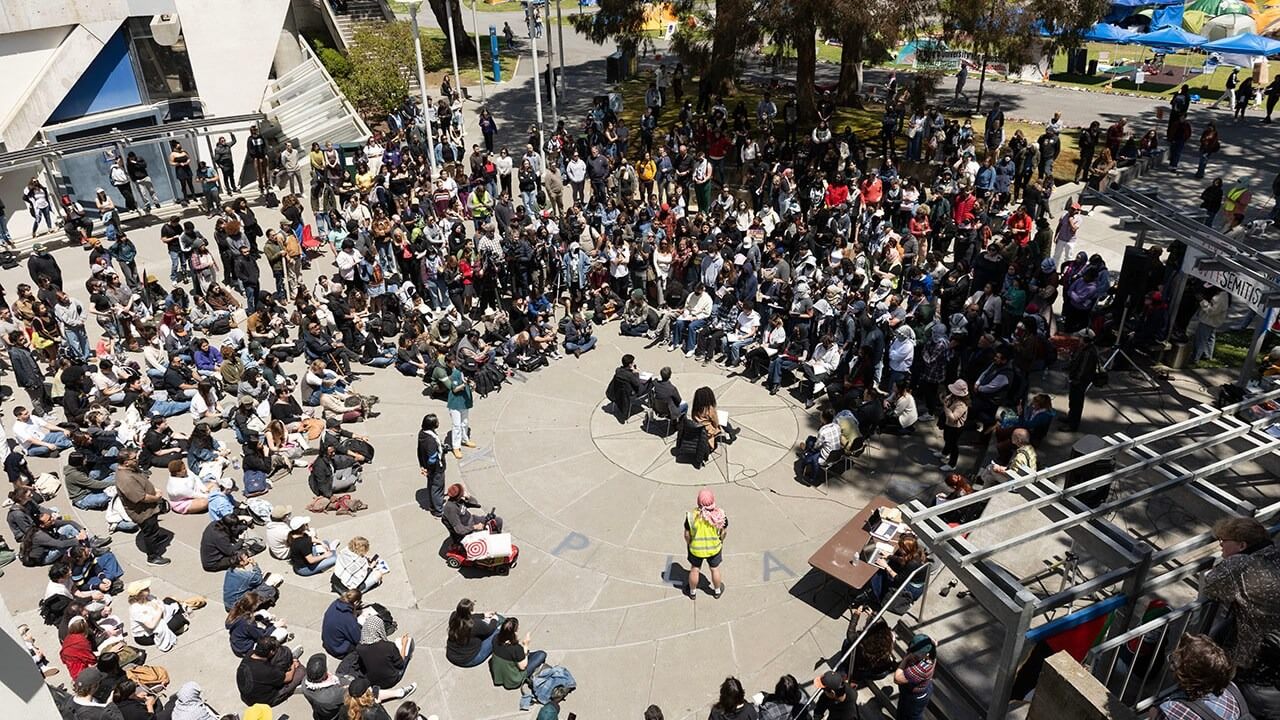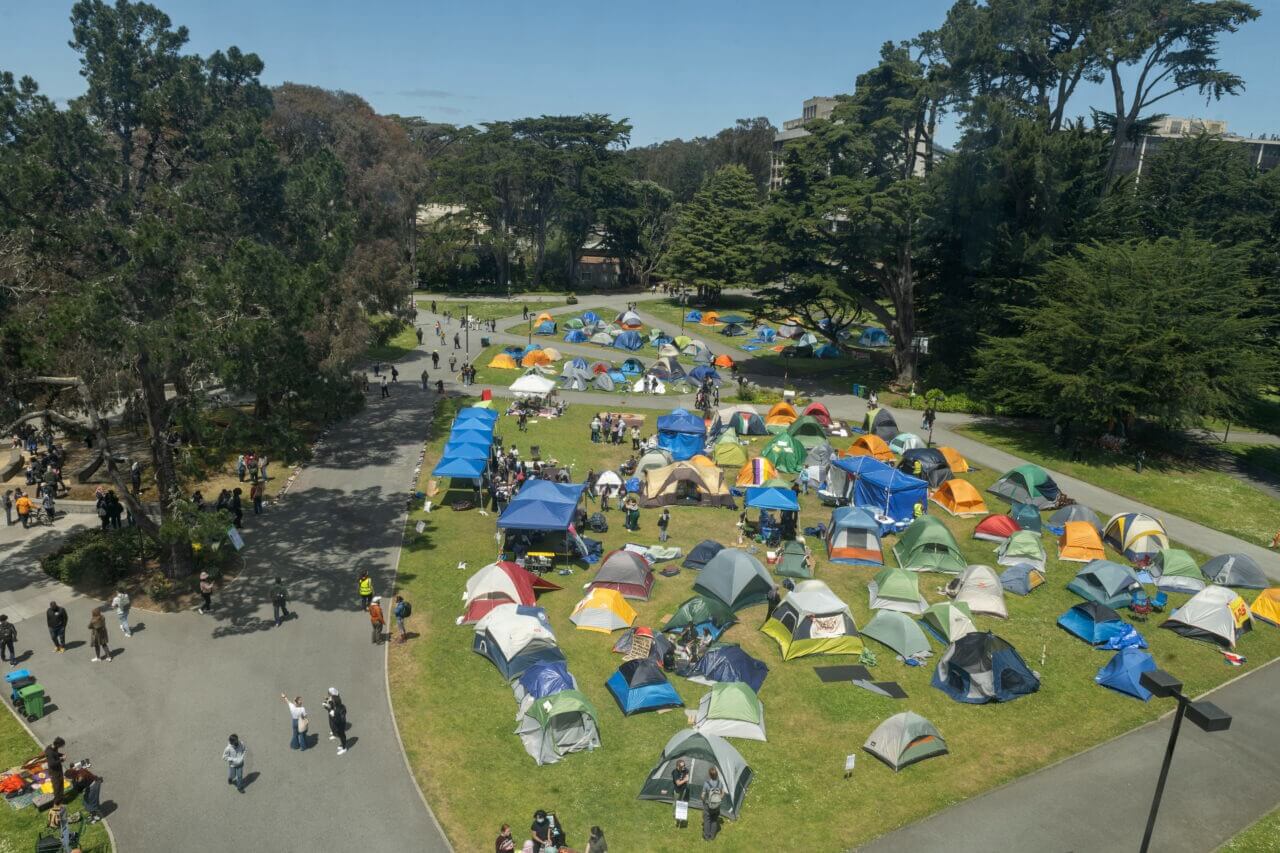San Francisco State University president negotiates with tent camp leaders over Israel investments
S.F. State’s president meets with leaders of the school’s pro-Palestinian encampment to discuss their demands over divestment from Israel

Hundreds of observers pack the quad at San Francisco State University for an open negotiation session between pro-Palestinian protesters and university administrators on Monday, May 6. Photo by Aaron Levy-Wolins
This story originally appeared on J. The Jewish News of Northern California, and was reprinted here with permission.
Surrounded by students and faculty, the president of San Francisco State University met in public Monday afternoon with negotiators from the school’s pro-Palestinian encampment to discuss their demands over divestment from Israel.
SFSU President Lynn Mahoney sat outside on the campus in front of a large group of onlookers, addressed questions and comments from students representing the encampment, and praised them as “exemplars.” Protesters livestreamed the negotiations on Instagram.
“I welcome the opportunity to look at our investment policy to better align with our role as an agent of social justice,” she told them.
Tents began to go up on April 29 at SFSU, following the lead of pro-Palestinian students at dozens of universities across the country. By Monday, the encampment had grown to about 100 tents. If the students accept the outcome of the negotiations, they said they will dismantle the encampment.
Mahoney seemed receptive to the idea that the university could consider certain values as investment principles that would satisfy the students. She did not specify boycotting Israel, which may not be possible under California law. But she indicated that enshrining certain values in investment policy would be appropriate.
“Let’s talk about going back and revising our policy to add — again, not region-specific — but [rather] just in the same way we’ve aligned with racial and social justice, and aligned with investing in climate change solutions,” she told them.
The students’ demands, by contrast, are quite region-specific, such as divestment from “companies and partnerships which actively participate in the colonization and ethnic cleansing of the Palestinian people.”
One of their demands focuses on transparency around SFSU’s investments. Mahoney seemed to endorse the idea of a website that would display more information about the school’s investments.
“We have to discuss what transparency would look like with the investment committee and the company Cambridge that does our investments. And yes, I’d be happy to do something more permanent,” she said.
Mahoney told students that two other California State University presidents she had spoken to were “on board for a similar conversation about their investment policies.”
“I guarantee there are others who are also thinking this way,” she said. “Let me just say, you’ve all been heard. You have been heard.”
She also praised the protesters for keeping the encampment and rallies peaceful and reiterated that her role is to keep students safe.
Referencing the fact that pro-Palestinian protesters at SFSU, like at many other school encampments and rallies since the Israel-Hamas war began, wear masks to hide their identity, she said “it kills me that y’all have to keep your faces covered. I know why you do it. But it kills me that you have to do that in the U.S.”
After the public negotiations, the leaders of the student protests withdrew to discuss their response to Mahoney’s overtures. As of publication, it was unclear whether a decision had been made to dismantle the camp.
Roger Feigelson, executive director of SF Hillel, followed the negotiations and praised Mahoney.
“I thought she was reasonable in offering to meet with select students to review investment strategy and increase transparency. I appreciated her focus on what she can control — providing an environment for all students that respects free speech and academic freedom, encouraging dialogue where everyone can feel safe,” he said in an email to J. That is the “kind of discussions you’re supposed to be able to have at an institution of higher learning.”
Tye Gregory, CEO of the Jewish Community Relations Council Bay Area, told J. that some of Mahoney’s comments on Monday may have been “too conciliatory” toward the protesters but that he supports her decision to meet with them.
“She should be engaging in de-escalation” and trying to keep the campus as “peaceful as can be,” he said, noting the violence at encampments at Columbia University and UCLA.
Gregory added that California State University’s chancellor released a statement last week about divestment and doesn’t expect that Mahoney will go against it.
“California State University does not intend to alter existing investment policies related to Israel or the Israel-Hamas conflict,” according to the April 30 statement from CSU Chancellor Mildred Garcia. “While the CSU affirms the right of our community members to express diverse viewpoints, a divestment of this sort impinges on the academic freedom of our students and faculty and the unfettered exchange of ideas on our campuses.”

Gregory said that his primary interest right now isn’t about divestment. It’s about hate speech against Jews and Israel.
“My main concern with all these schools is that there is fundamental disagreement about hate speech. We cannot allow it to be normalized” even when it is free speech and legal, he said.
While some universities have turned to police to dismantle the encampments that began at Columbia University in mid-April, a small number of universities have negotiated to shut down the tent camps.
At Brown University in Rhode Island, the president announced on April 30 that the board would consider and later vote on a measure to divest from Israel. In return, the encampment was dismantled. And at Northwestern University in Illinois, a deal was reached on April 30 to shut down the encampment while allowing other protests only by students to continue. That agreement includes promised funding for Palestinian academics and students.
Mahoney has been dealing with conflicts over Israel at the university since she took the top job in 2019.
In 2020, after the student government passed a boycott, divestment and sanctions resolution against Israel, Mahoney said she would not support it.
“Some would have us believe that you are either Pro-Palestinian or Pro-Israel; that you are either an antisemite if you oppose Zionism or a racist if you support it,” she wrote in an email to the campus in 2020. “These binaries do not do this issue justice nor do they do justice to us as a University.”
On Monday, one student speaker demanded that Mahoney “publicly oppose” SB 1287 — a state bill backed by the California Legislative Jewish Caucus — and make a statement about Palestine. The bill would require the student codes of conduct at the state’s public colleges and universities to “prohibit violence, harassment, intimidation and discrimination” that “interfere with the free exchange of ideas, or call for or support genocide.”
Mahoney said that she didn’t know enough about the bill and that her job is to safeguard academic freedom.
“As the president of a university, I don’t make political statements,” she said. “I have in the past broadly talked about how I don’t support, as an individual, violence or violence against unarmed civilians.”





















